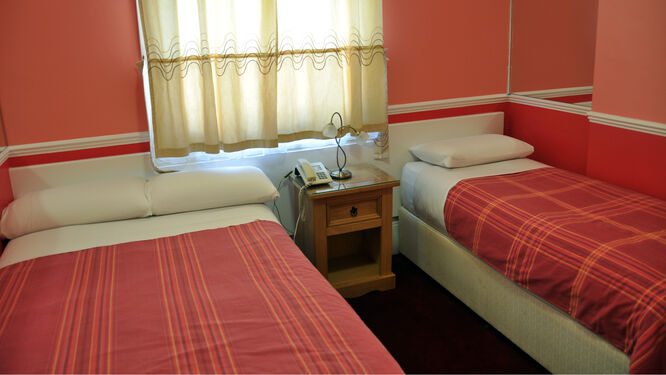Budget Hotels: What to Expect
By Rick Steves
Europe has a class of budget hotels that's rare in the US: Friendly, no-nonsense, quirky little places — usually family-run — offering good-enough-for-the-European, good-enough-for-me beds for around $100 a night (less in southern Europe, more in big cities north of the Alps). While these older, traditional hotels are becoming something of an endangered species, they're certainly out there, and not too hard to find, particularly in southern Europe (Italy, France, Spain, Portugal, and Greece).
The best of these places offer comfort and character at affordable prices in smartly renovated older buildings that still retain their Old World feel. You'll climb lots of stairs, as a hotel's lack of an elevator is often the only reason it can't raise its prices. And you'll be given a front-door key because the desk is not staffed all night.
At the very low-end range, you'll likely get a simple bed, a wobbly old chair and table, a freestanding closet, a small window, and a view of another similar room across a tall, thin interior courtyard. In the cheapest places, you may have a TV, and you'll share the toilet and shower or tub down the hall with a handful of other rooms (saving you a bundle of money).
Picture this experience I had recently at a "characteristic" hotel in Florence: After checking in at the front desk in a central, historic, and protected 500-year-old building, then weaving through a labyrinthine floorplan to find my room, I opened the door and was confronted with a daunting carpeted staircase…thankfully with a good railing. It led steeply up to a room with rickety furniture, mismatched drapes, a canopy bed, and a terrace with a commanding view of Florence.
This is hard-core Europe: fun, cheap, and unique. The hotel I'm describing may be appalling to many Americans; to others, it's charming, colorful, or funky. To me, "funky" means spirited and full of character(s): a caged bird in the TV room, grandchildren in the backyard, a dog sleeping in the hall, no uniforms, singing housekeepers, a handwritten neighborhood history lesson on the wall, and different furniture in each room. An extra $40–50 per night will buy you cheerier wallpaper and less funkiness.
As Europe becomes more affluent, its big cities are gentrifying, and Europeans are coming to expect what were once considered "American" standards of plumbing and comfort. Centrally located, old-school hotels are being bought out, gutted, and turned into pricier modern places. But you can still find good values at the remaining budget hotel that structurally can't fit showers in every room or an elevator up its spiral staircase. Prices are regulated, and regardless of how comfy and charming it is, with no elevator and a lousy shower-to-room ratio, it is — and will remain — a cheap hotel.

